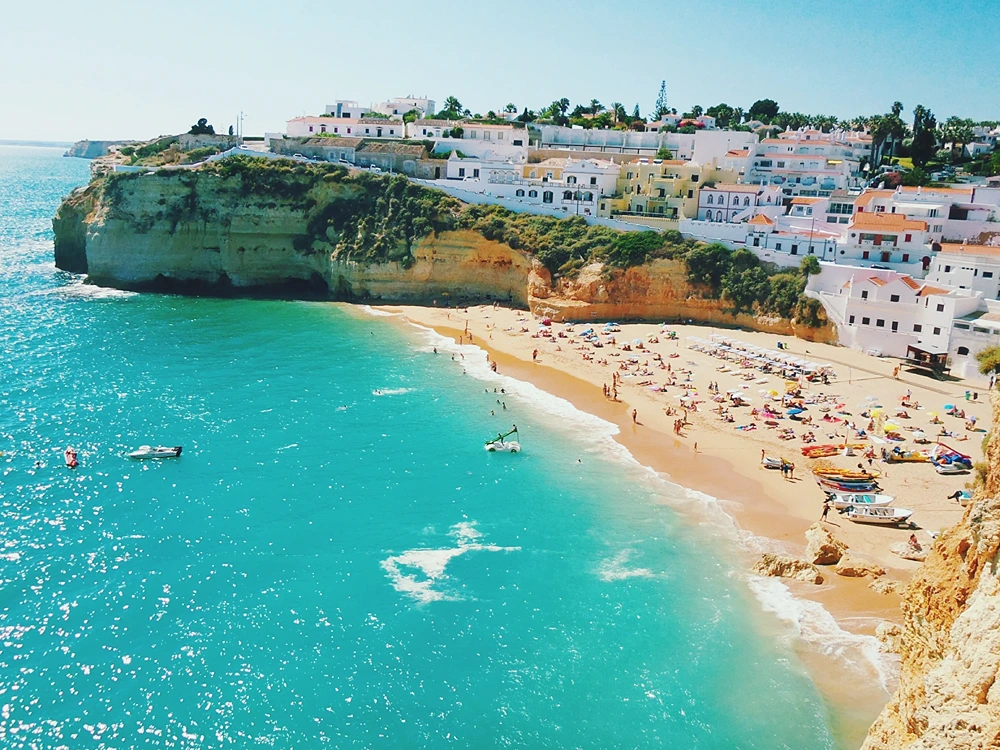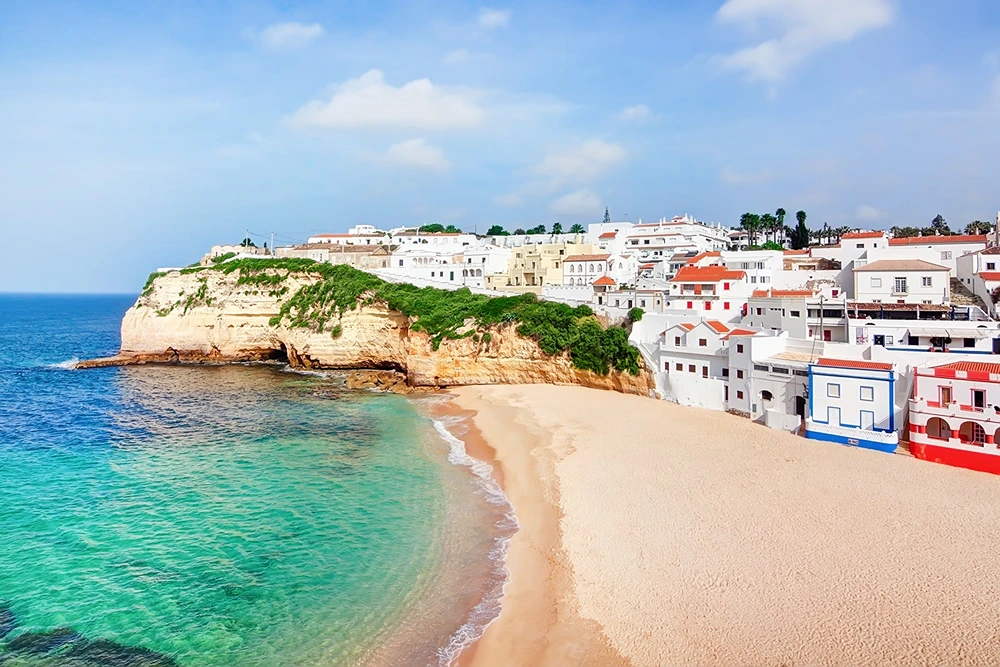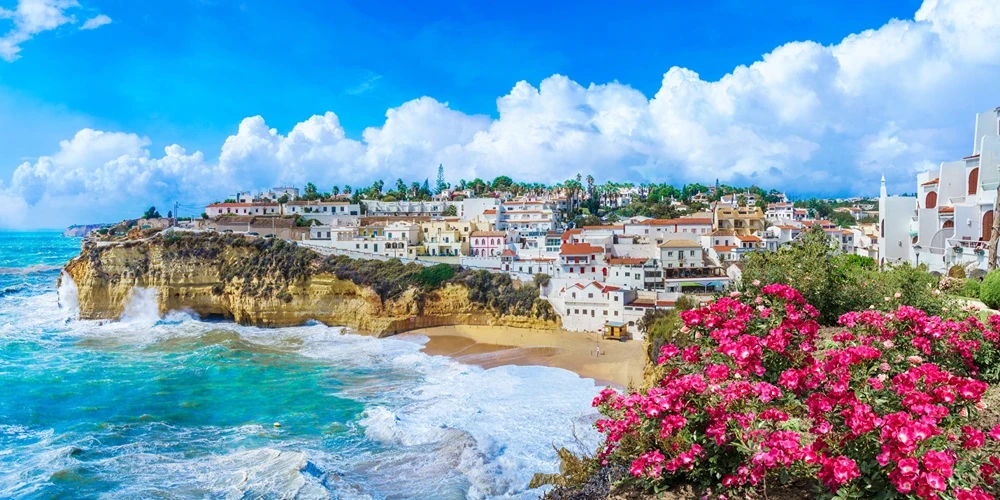Travel Resources
Before you embark on your Algarve adventure, consider these valuable resources:
- Flights: Find affordable flights to Faro Airport (FAO) using our flight search tool.
- Travel Insurance: Ensure peace of mind with comprehensive travel coverage.
- Car Rental: Explore the Algarve’s scenic landscapes at your own pace.
- Tours: Discover the best experiences with trusted local operators.
- Packing Checklist: Don’t forget essentials like swimwear, sunscreen, and comfortable walking shoes.

Some History First
The Algarve boasts a rich history dating back to ancient times. The region was inhabited by various civilizations, including the Phoenicians, Carthaginians, and Romans. From the 8th to 13th centuries, the Algarve was under Moorish rule, which left a lasting impact on its architecture, cuisine, and culture. In 1249, the region was fully integrated into the Kingdom of Portugal. During the Age of Discoveries, the Algarve played a crucial role in Portugal’s maritime explorations, with Lagos serving as a key port. Today, remnants of this fascinating history can be seen in the Algarve’s castles, churches, and traditional villages, making it a living testament to centuries of diverse influences.
The Algarve Today
Today, the Algarve stands as one of Europe’s most popular holiday destinations, attracting millions of visitors annually. With a perfect blend of traditional charm and modern amenities, the region offers something for every type of traveler. Tourism is the primary economic driver, followed by agriculture and fishing. Despite its popularity, many towns and villages maintain their traditional character. The Algarve is renowned for its world-class golf courses, water sports, and hiking trails, offering outdoor enthusiasts a paradise of activities. Visitors can experience vibrant markets, fresh seafood restaurants, and a laid-back Mediterranean lifestyle that epitomizes the region’s appeal.
Is the Algarve Safe?
The Algarve is generally considered a safe destination for tourists, with low crime rates compared to many other European holiday spots. The Portuguese police have a visible presence in tourist areas, contributing to the overall sense of security. However, as with any popular tourist destination, it’s wise to take standard precautions. Be aware of your surroundings, especially in crowded tourist areas, and keep valuables secure to avoid pickpocketing. When enjoying the beautiful beaches, pay attention to flag warnings and follow beach safety guidelines. For late-night transportation, use reputable taxi services or ride-sharing apps.
Where is the Algarve?
The Algarve is located in the southernmost region of mainland Portugal, stretching along approximately 155 kilometers (96 miles) of Atlantic coastline. The region extends from the Spanish border in the east to Cape St. Vincent in the west, known as the southwesternmost point of continental Europe. Major cities include Faro (the capital), Lagos, Albufeira, and Tavira. The Serra de Monchique mountain range forms a natural border with the Alentejo region to the north. This unique location provides a perfect mix of Mediterranean and Atlantic influences, resulting in the Algarve’s exceptional climate and diverse landscapes, from golden beaches to rugged cliffs and serene countryside.
Latest Articles
From The Area
Nothing found.
What is the Best Time to Visit the Algarve?
The Algarve enjoys a Mediterranean climate with over 300 days of sunshine per year, but the best time to visit depends on your preferences:
- Spring (March to May): Mild temperatures and fewer crowds make this ideal for sightseeing and outdoor activities.
- Summer (June to August): Peak season with hot weather, perfect for beach lovers but expect larger crowds and higher prices.
- Fall (September to October): Still warm enough for swimming, with fewer tourists and lower prices.
- Winter (November to February): Mild temperatures, occasional rain, and the quietest period. Great for golf and exploring inland areas.
For the best balance of good weather and smaller crowds, consider visiting in late spring or early autumn.
How to Get to the Algarve & Around
The Algarve is easily accessible and well-connected:
- By Air: Fly into Faro Airport (FAO), the main gateway to the region, with direct flights from many European cities.
- By Train: Regular train services connect Faro to Lisbon and other major Portuguese cities.
- By Bus: Long-distance buses operate between the Algarve and other parts of Portugal and Spain.
Getting around the Algarve:
- Rental Car: Recommended for maximum flexibility, especially for exploring rural areas.
- Bus: Efficient regional network connecting major towns.
- Train: Services along the coast from Lagos to Vila Real de Santo António.
- Taxis and Ride-sharing: Readily available in tourist areas.
Having a car gives you the freedom to explore hidden beaches and picturesque villages off the beaten path.
Things to Do in the Algarve
The Algarve offers a wealth of activities and attractions:
- Beach hopping: Explore famous beaches like Praia da Marinha and Praia da Falésia.
- Water sports: Try surfing, kayaking, or stand-up paddleboarding.
- Boat tours: Visit sea caves, spot dolphins, or cruise along the dramatic coastline.
- Golf: Play on world-class courses with stunning ocean views.
- Historical sites: Explore castles, churches, and ancient ruins in towns like Lagos and Silves.
- Nature walks: Hike along the scenic Seven Hanging Valleys Trail.
- Cultural experiences: Visit traditional markets and attend local festivals.
- Food and wine tasting: Sample regional specialties and visit wineries in the countryside.
Don’t miss the chance to watch the sunset at Cape St. Vincent, the southwesternmost point of Europe.
Where To Stay In the Algarve
The Algarve offers a wide range of accommodation options:
- Albufeira: Popular for nightlife and family-friendly beaches.
- Lagos: Historic charm and beautiful beaches.
- Tavira: Quieter option with a traditional Portuguese feel.
- Vilamoura: Upscale resort area with marina and golf courses.
Accommodation types include:
- Luxury resorts in areas like Vilamoura and Vale do Lobo
- Boutique hotels in historic towns
- Self-catering apartments for families or longer stays
- Guesthouses and B&Bs for a local experience
- Camping and glamping options for nature lovers
Consider staying in different areas to experience the diverse character of the Algarve.

What To Eat In the Algarve
Algarve cuisine is a delicious blend of fresh seafood, local produce, and Moorish influences:
- Grilled sardines: Especially popular during summer festivals.
- Cataplana: Seafood stew cooked in a traditional copper pot.
- Piri-piri chicken: Spicy grilled chicken with a local chili sauce.
- Feijoada: Hearty bean and meat stew.
- Almond and fig sweets: Traditional desserts showcasing local produce.
Don’t miss:
- Medronho: Strong fruit brandy from the local arbutus tree.
- Algarve wines: Try the region’s increasingly popular wines.
- Fresh orange juice: From local orchards.
Look for restaurants frequented by locals for authentic experiences and try the “prato do dia” (dish of the day) for good value meals.
Entry & Exit Requirements
For a smooth entry into Portugal and the Algarve:
- EU/EEA/Swiss citizens: Can enter with a valid ID card or passport.
- Other nationalities: Check visa requirements based on your country of origin.
- Passport validity: Must be valid for at least three months beyond your planned stay.
- Schengen Area rules: Visitors from non-EU countries are generally allowed to stay for up to 90 days within a 180-day period.
Always check the latest entry requirements before traveling, as regulations may change.
What To Pack For Your Trip
Ensure a comfortable and enjoyable trip by packing these essentials:
- Lightweight clothing and swimwear
- Sun protection: High SPF sunscreen, sunhat, sunglasses
- Comfortable walking shoes for exploring
- Beach gear: Towel, waterproof bag, snorkeling equipment
- Light jacket or sweater for cooler evenings
- Adapter for European power outlets
- Reusable water bottle
- Travel documents: Passport, travel insurance details, booking confirmations
Don’t forget to pack any necessary medications and a basic first-aid kit.
FAQs
While not essential, having a car gives you more flexibility to explore remote areas and scenic coastal routes.
Yes, the Euro (EUR) is the official currency of Portugal and is widely accepted throughout the Algarve.
Some of the best beaches in the Algarve include Praia da Marinha, Praia da Falésia, and Praia de Benagil.


